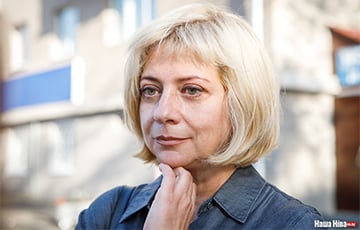Black Hand, Red Button
7- 16.08.2024, 12:46
- 32,370

PHOTO: NASHA NIVA
Lukashenka no longer remembers what happened yesterday.
Yesterday, all day long, everyone around was quoting scary stories authored by Lukashenka about a black hand, a coffin on wheels, and a red button. “Girl, watch out, the black hand is already walking down your street”. “The coffin on wheels is already in your entryway.” “All that's left is to press the red button.” And Russian propagandists listen and nod with an important air. Of course, they don't believe in the red button, they're just paid to look sage. But what about Lukashenka? Does he really believe that he has a red button that he can press whenever he wants?
It seems so. He does. I do not even rule out that every morning they bring him a roughly knocked together wooden box with a large button painted blood-red, and say: “Here, press it, dear Aliaksandr Ryhoravich. What are your plans for today? To hit Tallinn with a nuclear missile? Or Berlin, maybe? And what about Riga?” Lukashenka replies: okay, not today; today we will go to the farm to see the workers, tomorrow would be better — everyone knows anyway that I will not think long. The next day everything repeats itself again.
Everything really does repeat itself, especially in history. There was already one such dictator in the twentieth century — the Portuguese Antonio Salazar. He also liked to say that he would not lead his people to follow the civilized world: Portugal, he said, is a backward country, and this is a flattering characteristic for it. He also gave orders to destroy opponents and built concentration camps for dissenters. On Salazar's orders, PIDE secret police agents hunted oppositionists who had managed to escape the country all over the world. And the Tarrafal torture camp in Cape Verde, which the Portuguese called a slow death camp, can be compared to either the Navapolatsk or Hlybokaye colony.
In 1968, Salazar fell off a chair and hit his head. He fell into a coma for a while. And his loyal comrades did an elegant somersault: they removed the dictator from power, but did not tell him about it. And now imagine: the dictator comes to senses in a hospital ward, and as usual, loyal ministers and generals with worried faces are around him. They wish him a speedy recovery and say that without him, Portugal is dead, so the father of the Portuguese people will have to work even from a hospital bed. They bring him documents to sign, come with reports and even bring newspapers printed especially for him in a single copy. In those newspapers, he is still an outstanding ruler, without whom the rain will not fall and the grapes will not grow. Right in the hospital, performances are staged under the name of “government meeting”, important issues are decided, resignations are accepted and new appointments are made. And outside the hospital room, a completely different life is already underway. And this whole show continued for two years, until Salazar's death. He died convinced that he ruled Portugal and controlled everything that happened there.
So, it looks like Lukashenka is in the same situation. Every morning, along with a newspaper, a cup of coffee and a box with a wooden button are brought to him by Tsiartsel and Kubrakou, Balaba and Karpiankou, Karayeu and Kachanava. They report that there is order in the country and the people love the leader. The people are quiet and grateful, accommodating and understanding, happy with everything and dreaming of only one thing: to have the leader forever. Then they take him somewhere to meet with these people. Like a newspaper in one copy, a dozen reliable actors are gathered from all over the country, portraying delight and joy and begging Lukashenka not to abandon them, not to make them poor orphans in a hostile world and to keep his finger on the red button around the clock. For their part, they promise to collect an unprecedented harvest and vote early. Then Lukashenka is taken back. At the residence they can still allow some Palestinian ambassador to see him, who will confirm that this is so, and not only the Belarusian people, but the whole world dreams of only one thing — the eternal, the everlasting. And that's it, the day has passed, you can go about your business — to the bathhouse, to go fishing, to a banquet. Of course, all this is happening with some adjustments for the twenty-first century with the Internet, but the essence does not change: Lukashenka has long ceased to see the world outside the mansion, much less understand what is happening in this world. He looks into the eyes of those who come to him with reports, and has lost touch with reality forever. By the way, it is possible that he presses the button from time to time when he is in a bad mood. But this is not a problem — in the morning they bring him a new box with a freshly painted red button. He will not remember what happened yesterday anyway.
Iryna Khalip, exclusively for Charter97.org











